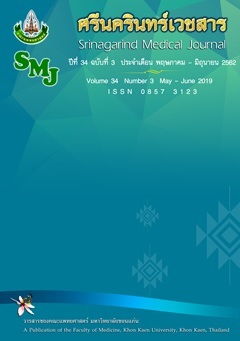Development of Prescribing Error Program for Reporting in Srinagarind Hospital
Keywords:
ความคลาดเคลื่อนการสั่งใช้ยา; ความคลาดเคลื่อนทางยา, prescribing errors; medication errorAbstract
Background and Objective: One of indicators for assessment quality of hospital was prescribing error. Which could guarantee the effectiveness in treatment and safety of medication use in patients. Because of Srinagarind hospital lacks of the effective method to collect prescribing errors. The objectives of this study were to introduce the computer technology into the process for collecting and reporting data of prescribing errors. Thus, leading to identify the types and formats of prescribing errors.
Methods: This study was a descriptive study, designed and developed “Prescribing error program” with the Microsoft access 2007. Data was collected from prescription of the out-patients and in-patients at pharmacy service in Srinagarind hospital, during October 1st 2016 to September 30th 2017.
Results: Nine hundred and seventy-four prescribing errors were detected in out-patient’s prescription (1.58 per 1,000 prescriptions). The most frequently found in “medicine department” (37.17%), followed by “pediatrics department” (19.20%) and “surgery department” (9.65%), respectively. The most common type of problem were “unclear dosage regimen” (39.57%), followed by “drug duplicate” (11.91%) and “wrong amount of medicines” (11.29%), respectively. The most severity of identified prescribing errors was classified as level B (99.38%). In the part of in-patients’s prescription, there were 693 prescribing errors (0.634 per 1,000 prescriptions). The most frequently found in “medicine department” (43.87%), followed by “surgery department” (18.90%) and “pediatrics department” (12.41%), respectively. The most common type of problem were “the save command in the hospital information system does not match prescriptions” (17.75%), followed by “over dose” (15.73%) and “unclear or wrong of drug strength” (6.78%), respectively. The most severity levels of prescribing errors was classified as level B (84.13%).
Conclusions: This program was an innovation of technology for collecting, retrieving including analyzing and reporting prescribing errors. They could summarize the problems in time and input data for future in order to solve and prevent the prescribing errors. This program may increase efficiency in providing pharmaceutical care to the patients.
References
2. Aronson JK. Medication errors: what they are, how they happen, and how to avoid them. QJM 2009;
102: 513-21.
3. Velo GP, Minuz P. Medication errors: prescribing faults and prescription errors. Br J Clin Pharmacol 2009; 67: 624-8.
4. ลดาวัลย์ ศิริลักษณ์, พีรธัช บัวลอย. ความชุกและลักษณะความคลาดเคลื่อนในการสั่งยาสำหรับ
ผู้ป่วยในก่อนออกจากโรงพยาบาลในระดับตติยภูมิแห่งหนึ่งในปี 2557. วารสารเภสัชกรรมไทย 2559; 8: 58-67.
5. สุมิตรา สงครามศรี และ มาลินี เหล่าไพบูลย์. การสั่งยาด้วยระบบคอมพิวเตอร์ในการลดความคลาดเคลื่อนในการสั่งใช้ยาโรงพยาบาลหนองหาน จังหวัดอุดรธานี: Interrupted Time Series Design. วารสารเภสัชศาสตร์อีสาน 2560; 13: 53-66.
6. Kozer E, Scolnik D, Keays T, Shi K, Luk T, Koren G. Large errors in the dosing of medications for children. N Engl J Med 2002; 346:1175-6.
7. Bobb A, Gleason K, Husch M, Feinglass J, Yarnold PR, Noskin GA. The epidemiology of prescribing errors: the potential impact of computerized prescriber order entry. Arch Intern Med 2004; 164: 785-92.
8. อภิลักษณ์ นวลศรี. ความคลาดเคลื่อนทางยากับการใช้ระบบสั่งยาทางคอมพิวเตอร์จากหอผู้ป่วย. สงขลานครินทร์เวชสาร 2549; 24: 1-8.
9. เพ็ญนภา สำเนียง. Access 2007. กรุงเทพมหานคร: เอส.พี.ซี.บุ๊คส์; 2552.
10. นันทนี แขวงโสภา. คู่มือ Access 2007 : ฉบับสมบูรณ์. กรุงเทพมหานคร : โปรวิชั่ว; 2551
11. Strand LM, Morley PC, Cipolle RJ, Ramsey R, Lamsam GD. Drug Related Problems : Their Structure and Function. Ann. Pharmacother 1990; 24: 1093-97.
12. Hassan Y, Gan EK. Using pharmacist workup of drug therapy. In: Manual of pharmacist workup of drug therapy in pharmaceutical care. University of Sains Malaysia 1993; 4-41.
13. National Coordinating Council for Medication Errors Reporting and Prevention. NCC MERP Taxonomy of Medication Errors [Online]. [Accessed 9 April 2018]. Available from http://www.nccmerp.org/sites/default/files/taxonomy2001-07-31.pdf
14. ปัญญฉัตร ซอสุขไพบูลย์. ระบบรายงานความคลาดเคลื่อนทางยาจากโปรแกรมคอมพิวเตอร์ที่พัฒนาขึ้นในโรงพยาบาลขนาดใหญ่แห่งหนึ่ง. วารสารเภสัชกรรมไทย 2555; 4: 3-16.




